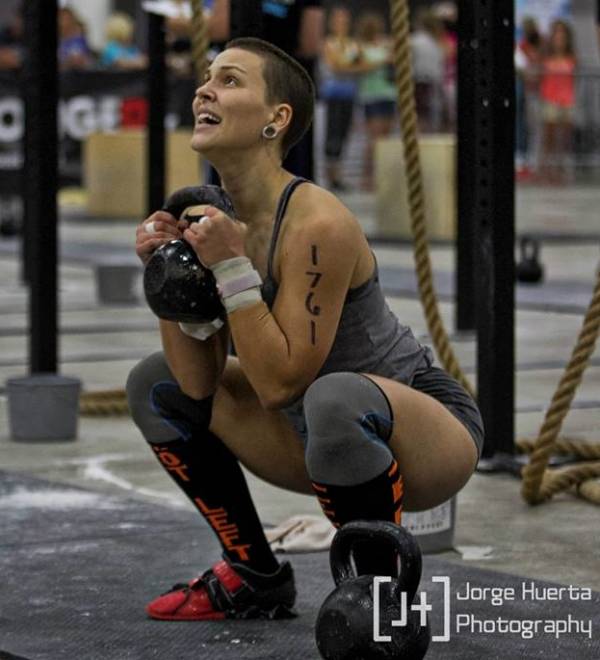Track your numbers. Track your food. Track your weights. Track your own weight. This is advice given to so many clients by so many trainers. But lately, I’ve found that not tracking any of it is leading to much better results for me.
The Life of a Competition Addict
I tracked everything for so many years. I weighed my food. I counted my Zone blocks. I’ve got training logs and lifting logs going back nearly a decade, with detailed notes about every aspect of every session.
I’ve got lists of personal records. Lists of Hero and Girl workout records. And lists of things I decided I needed to do about thirty seconds after I accomplished each personal record.
In other words, I’m not sure I ever enjoyed anything I accomplished. I was too busy plotting for the next accomplishment. Somebody else’s numbers were always better, or my improvement in number enticed me to further improve my own.
If I could row 2,000m in 8:05, then I should do it in under eight next time. If I could deadlift 225lbs for five reps, then I should lift 240 next time. If I could weigh 138lbs, then I should probably try to weigh 132.
Everything that was my ultimate goal became “not good enough” just seconds later.

It’s Not You, It’s Me
Welcome to the life of a competition addict. Competitive with myself and competitive with others. I was never competitive in a hateful way. I never resented anyone else for being better than me. Rather, I used it as inspiration – or perhaps flagellation is a better word – to drive myself to higher ground and bigger, better aspirations.
If you showed up and did thirty consecutive pull ups, then I was going to do 31. Not because I thought less of you, but in fact, because I thought more of you and wanted to cease suddenly thinking less of myself.
By your doing more, I wanted to do more. For years I always thought of this as motivation, as a purely positive thing. You were all helping driving me forward. But underneath it all was this addiction to competition, this judgment of everything I did, this constant feeling of “not good enough” coupled with a need to prove I was. While on the outside you were driving me forward, on the inside I was pushing myself down.
My Self-Imposed Rehab
These days I’m in what I call competition rehab. It’s a self-imposed rehab and I have to remind myself about my own rules for recovery pretty much every day.
The other week I decided my new sport would be running. I’m loving running currently. I’m doing it three to five days a week and finding it physically and mentally enjoyable. But before long I found myself thinking, “I’m going to make this my sport. What event should I enter?” Immediately I fantasized about marathons, and then ultra-marathons, about goal times, and milestones.
Ugh. I’ve got a knack for turning enjoyment into a slog, taking something positive and setting it on the road to the negative, it seems. I don’t mean to. It’s just how my mind works. It starts as constant improvement and optimization, and it turns into judgment of self.
So now, while I continue my exploration of running, I am practicing my rules for recovery as part of my self-imposed competition rehab. I am working on being non-competitive and just enjoying physical activity for physical activity. I am convinced that if I can purely enjoy it for the physical thing it is, in that very moment, I can mentally come to enjoy the right here and right now, as well.

My 5-Step Program to Rehab Your Competition Addiction
1. Let Go of the Numbers:
I never run with a Garmin and I never time my workouts. Typically I do AMRAPs or EMOMs and I do my best not to track how long things take me or how many rounds I actually do.
2. Stop Entering Competitions:
My gut instinct is always to sign up for a tournament, event, or some other public display of gut-wrenching competition. In the past I used these as landmarks to work toward and for motivation and accountability. Now, when I get this urge, I remind myself I can probably do all the same training on my own, without the stress and (self) judgment.
3. Stop Counting Calories:
Really, if you’ve counted calories and weighed your food for years like I have, you know very well when you’re eating the wrong thing or even too much of the right thing. Let go of the number obsession, make wise choices, and use a smaller plate if you have to.
4. Quit Getting on the Scale:
I weighed myself every morning for years. Years. Decades, even. The only purpose it ever served was to make me hate myself first thing every morning. My husband convinced me to stop weighing myself for a while and it’s hard to even explain the mental and emotional relief it’s allowed me. I can tell when I’m getting fat, for goodness’ sake, I don’t need the scale to point it out. But there were always those days when I actually woke up feeling good and downright sleek, but then the scale told me I was fat and I was crushed. Now that I don’t weigh myself, I don’t have those days. If I feel good, then I stay feeling good. And if I feel fat, I eat less. Go figure.
5. Remind Yourself Why You’re Doing It All:
I exercise and eat right so that I can have as many quality days, months, and years with my husband as possible. I want to spend time with my family and friends. I want to explore the world and enjoy it – and that means not only climbing monuments and hiking mountains, but drinking wine and eating bread on occasion. It also means taking a more moderate approach so I hurt less and experience fewer injuries.

Enjoy the Right Now
As a life-long competitor in all aspects of my life, learning to unwind that thought process has been a process in and of itself. But the older I get, the easier it gets (and I prefer to think that’s not related to my associated decreasing level of performance, thank you). And the mental and physical benefits of not competing are turning out to be a lot more valuable than any medal or trophy.
Are you a competition addict? Why do you love competition? Or why might you consider letting go of it for a while? Post your thoughts to the comments below.
Photo 1 courtesy of CrossFit Impulse.
Photos 2 and 3 courtesy of Jorge Huerta Photography.
Photos 4 and 5 courtesy of Shutterstock.






